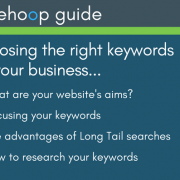Choosing the Right Keywords for your Business
Whilst the overarching aim of Search Engine Optimisation (SEO) is to make your website more visible through search engines, this objective probably needs a further qualification. The best SEO practice will be the approach that puts your website in front of the right people for your business. Choosing the right keywords plays a definitive role in this process.
What are your Website’s Aims?
What qualifies as the ‘right people’ will naturally vary by company or organisation. Consider what your website itself is trying to achieve. Are you looking to drive sales directly through your site? Are you looking for people to pick up the phone and make enquiries? Perhaps you’re looking for increased membership or to raise funds through a crowdfund.
There’s little value in driving large amounts of irrelevant traffic towards your site, so even if ranking at number one for a keyword with a good search volume, might seem like big positive, if it isn’t translating into your website’s goals then it’s time for a rethink.
Focusing your Keywords
Distilling the quality and relevance of your traffic starts with the choice of keywords you target. At a basic level, you need to think about who your audience is, and then what they’ll be searching for that will lead them to you.
A Leeds based bakery or sandwich shop for example, which earns a great deal of its business through morning and lunchtime deliveries to local businesses, needs to make sure that it can be found by potential customers who are using search terms focused on that specific local service, in this case ‘bakery delivery Leeds’ for example. Ranking well for your brand name and broader search terms isn’t necessarily serving you well if your rivals have the relevant local searches locked down. The volume of searches for a particular phrase might seem like its a good search term to target with your SEO work, but are those using this term going to help you reach your companies ultimate goals?
The Advantages of Long Tail Searches
These more focused keywords, known as ‘long tail’ searches, are often far lower in search volume than broader searches, but represent a great deal more intent on the part of a searcher. This means that in theory fewer visits to the site are needed to convert into a sale or enquiry. The search term ‘bike repairs’ for example has around 320 searches per month in the UK, whereas a more specific long tail search term ‘bicycle chain repair’ has only 20 per month. If your niche is in repairing chains then finding the audience for you in a broader search terms is like looking for a needle in a haystack. But by ranking well for a more focused term you’re more likely to convert. In this case, a search engine like Google acts as a kind of introductions agency, putting people with a particular problem in touch with a specific solution.
Because of the lower search volumes behind these long tail terms, typically there is also lower competition. As such, it’s easier to achieve a good ranking and to make yourself visible to a relevant audience through search.
How to Research your Keywords
Start by brainstorming. List your products and services and your area of businesses. Then think about your audience and what kinds of terms they’ll be using. Would consumers refer to your business in the same way that you would, or would they use less technical more ‘civilian’ terms for example.
You can then use tools to suggest additions to this list. With tools like SEMRush and Google Search Console offering functions which aid in keyword research including showcasing related search terms this is a good place to start. You can then look at the volume of searches that are being made for each term. But as we’ve highlighted above, don’t be put off by lower search volume if you think that the esotericism might mean greater specific interest in your product. Intent is central to SEO that performs well for your site.



